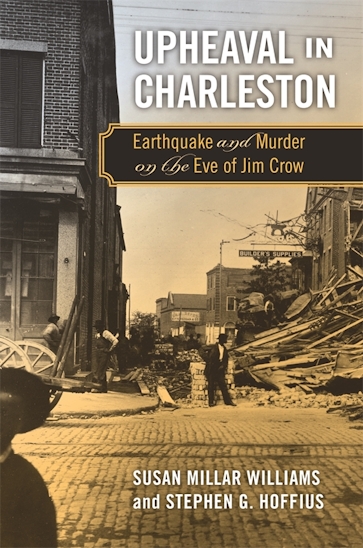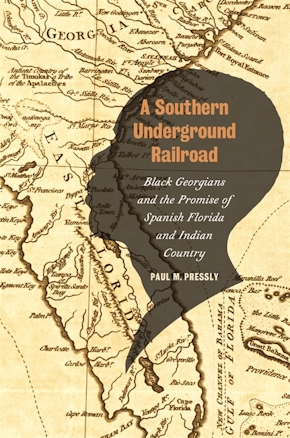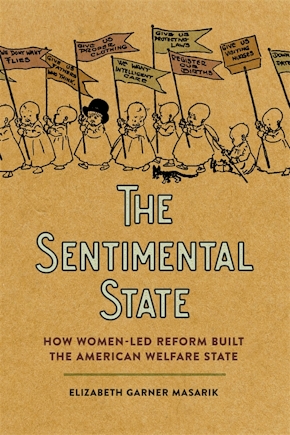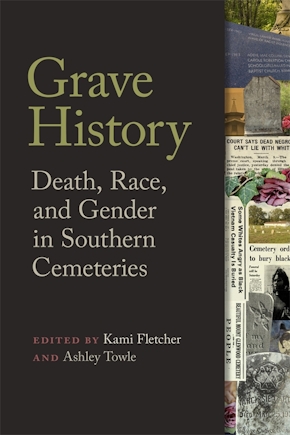Upheaval in Charleston
Earthquake and Murder on the Eve of Jim Crow
Title Details
Pages: 392
Illustrations: 36 b&w photos
Trim size: 6.000in x 9.000in
Formats
Paperback
Pub Date: 09/01/2012
ISBN: 9-780-8203-4421-8
List Price: $29.95
eBook
Pub Date: 06/01/2011
ISBN: 9-780-8203-3958-0
List Price: $29.95
Upheaval in Charleston
Earthquake and Murder on the Eve of Jim Crow
Skip to
- Description
- Reviews
- Awards
On August 31, 1886, a massive earthquake centered near Charleston, South Carolina, sent shock waves as far north as Maine, down into Florida, and west to the Mississippi River. When the dust settled, residents of the old port city were devastated by the death and destruction.
Upheaval in Charleston is a gripping account of natural disaster and turbulent social change in a city known as the cradle of secession. Weaving together the emotionally charged stories of Confederate veterans and former slaves, Susan Millar Williams and Stephen G. Hoffius portray a South where whites and blacks struggled to determine how they would coexist a generation after the end of the Civil War.
This is also the story of Francis Warrington Dawson, a British expatriate drawn to the South by the romance of the Confederacy. As editor of Charleston’s News and Courier, Dawson walked a lonely and dangerous path, risking his life and reputation to find common ground between the races. Hailed as a hero in the aftermath of the earthquake, Dawson was denounced by white supremacists and murdered less than three years after the disaster. His killer was acquitted after a sensational trial that unmasked a Charleston underworld of decadence and corruption.
Combining careful research with suspenseful storytelling, Upheaval in Charleston offers a vivid portrait of a volatile time and an anguished place.
In 1886 an earthquake devastated Charleston as thoroughly as one did San Francisco 20 years later. South Carolina historians Williams and Hoffius present a vivid account of the disaster and the political aftermath.
—Publishers Weekly
This is a tale of upheaval, in terms of both the earthquake and the politics, as the issue of segregation and Jim Crow became increasingly pressing. Recommended for those who appreciate books on natural disasters, American history, and the secret goings-on of the political world.
—Library Journal
If you are intrigued by Charleston and by a story of earthquake, fire, and murder, then you will love this history of a remarkable man and of a sad, tumultuous period in the city's life.
—Erskine Clarke, author of Dwelling Place: A Plantation Epic
A bittersweet portrait of America's bête noire city on the eve of Jim Crow. You come for the story and you leave feeling you've lived it.
—Ted Rosengarten
As the authors show so vividly, ‘natural disasters do not erase old conflicts—they reveal dirty secrets.’ Along the way we learn about a variety of fascinating topics—the history of science, charitable fund-raising, journalism, disaster tourism, urban architecture, Jim Crow segregation and African American activism. And the whole story is capped off with a shocking murder and gripping courtroom testimony: a real page-turner!
—Jacqueline Jones, author of Saving Savannah: The City and the Civil War
It's not simply a meditation on the earthquake and recovery nor is it just the story of the murder of former News and Courier editor Frank Dawson. Rather, it's a synthesis of these two events that, taken together, shed light on a city in a great state of flux: between the end of Reconstruction but before Jim Crow laws made clear that Southern blacks would be relegated to a lower rung.
—Charleston Post and Courier
A compelling account of the most powerful earthquake ever to hit the southeastern United States. Virtually every structure in Charleston and some as distant as central Ohio were damaged. This well-researched, suspenseful narrative weaves a story of how a historic city recovers—with human intrigue and conflict that ends in murder.
—Jack Bass
[Williams and Hoffius] must be commended for a painstaking and at times gripping reconstruction of the events that began on the night of August 31, 1886. Working largely from primary sources such as diaries, letters, and contemporaneous newspaper accounts, [they] have created a narrative history, intricate and meticulously documented, that reads like a well-plotted novel, largely avoiding the tedium of far too many academic histories.
—Jack Trotter, Chronicles
Runner-up
SIBA Book Awards, Southern Independent Booksellers Alliance
Runner-up
George C. Rogers, Jr. Book Award, South Carolina Historical Society



